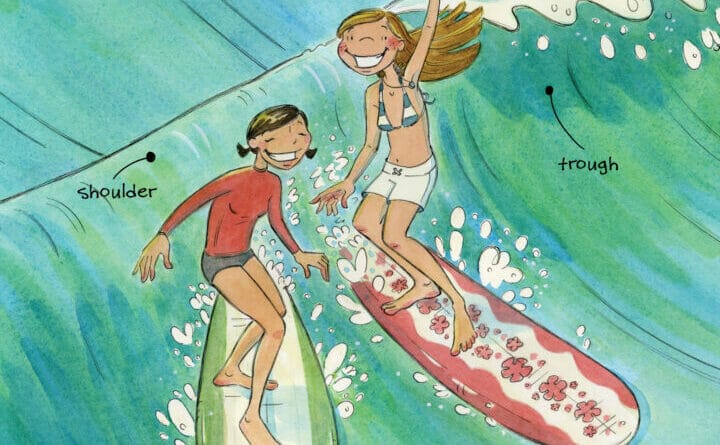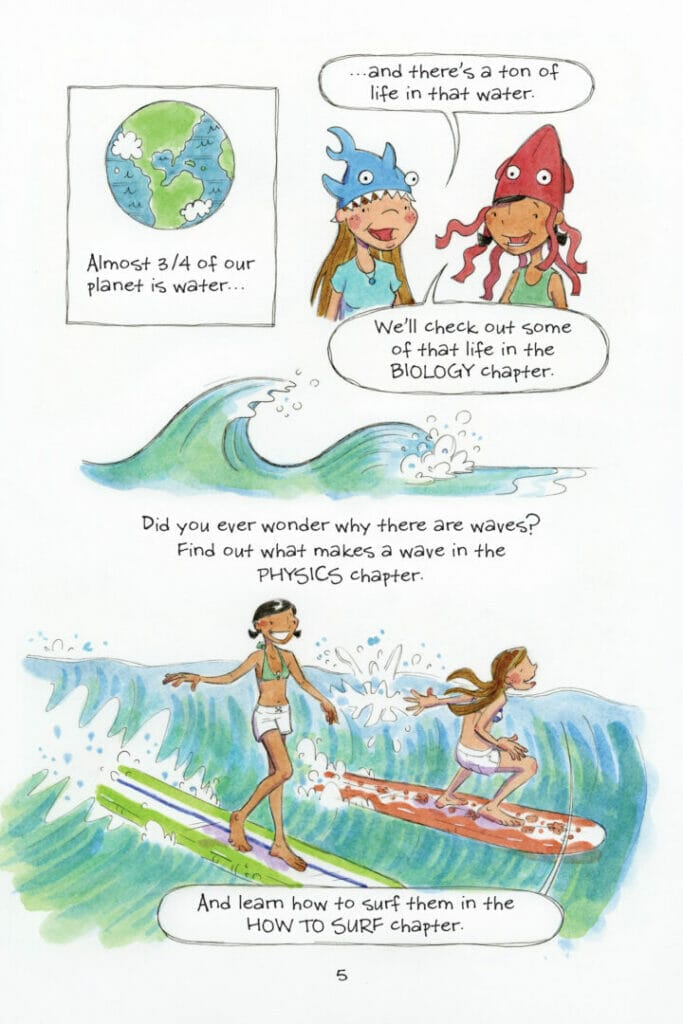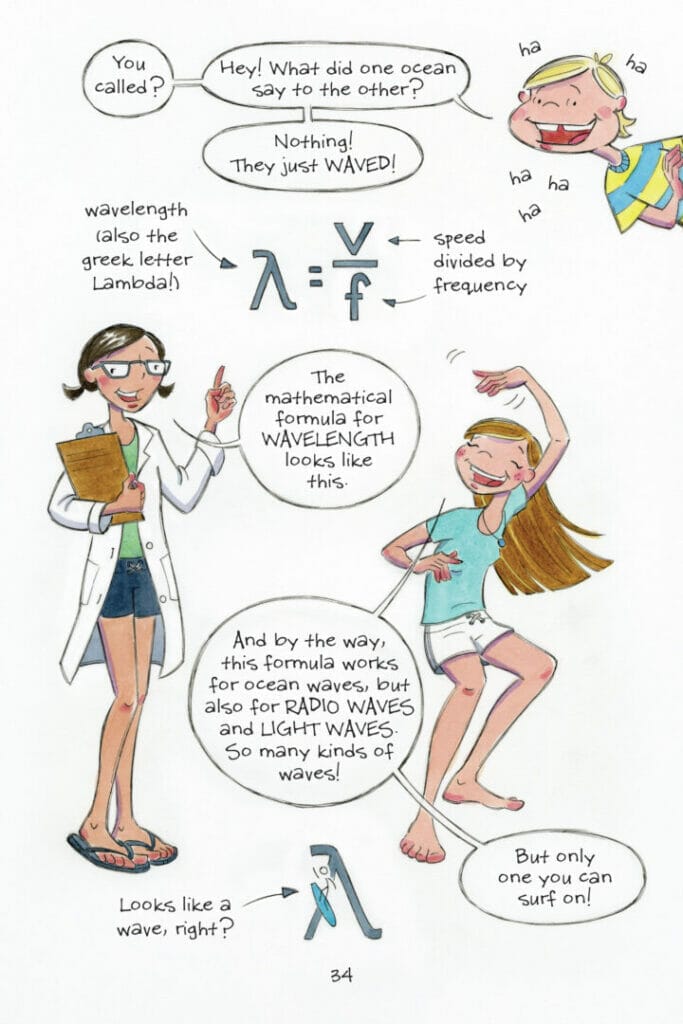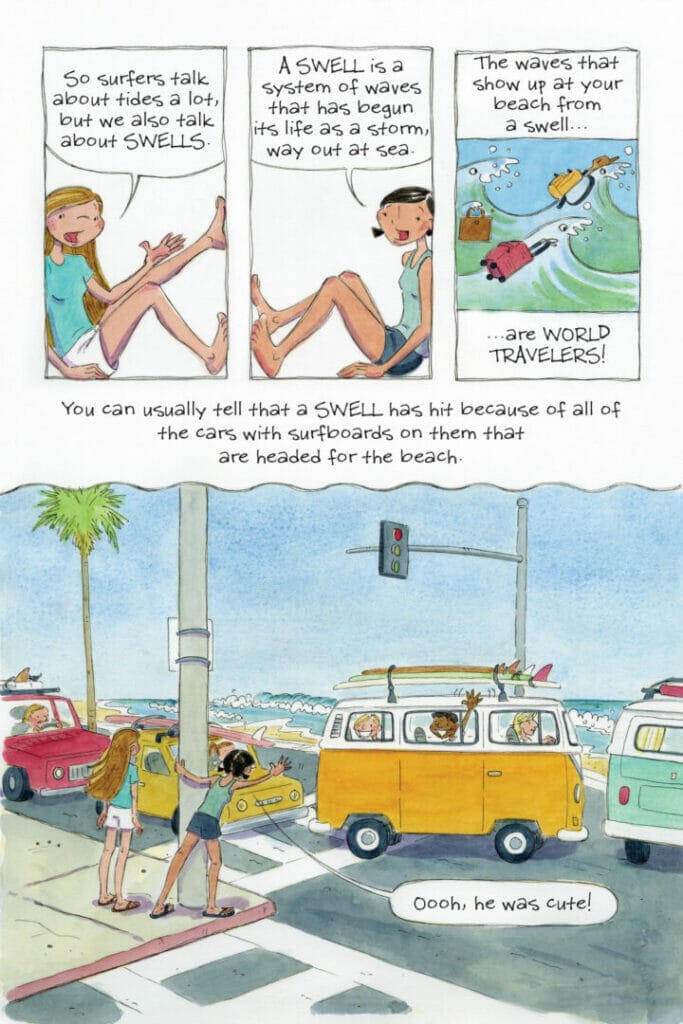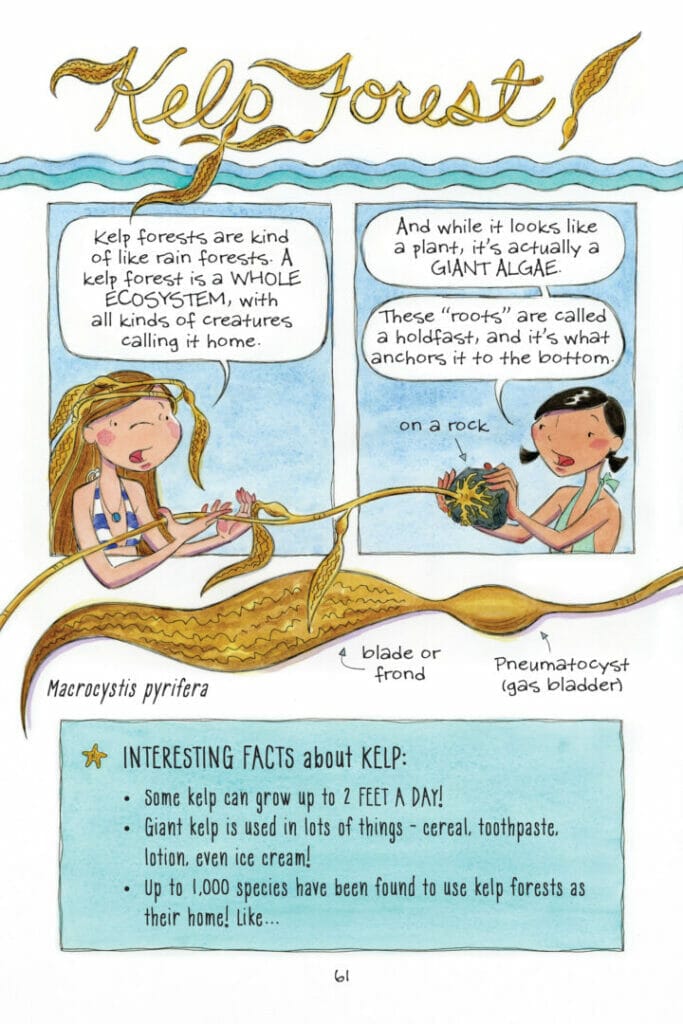Kim Dwinell talks “The Science of Surfing: A Surfside Girls Guide to the Ocean”, surfing, life as a lifeguard and how to preserve our habitat in this interview with The Nerdy Basement
Back in July, we sat down with author Kim Dwinell about the latest installment in her Surfside Girl graphic novel series, “The Science of Surfing: A Surfside Girls Guide to the Ocean”. We’ve been holding onto this interview to coincide with the release of the book, which unfortunately has been hit with a few shipping delays. Kim Dwinell’s “Surfside Girls” was set to release this week but will now release on September 28th. While we wait for the release of the book which serves as an in-depth and informative field guide to the ocean, how to surf and what animals you will encounter along the way, you can check out our full conversation with Kim Dwinell below.
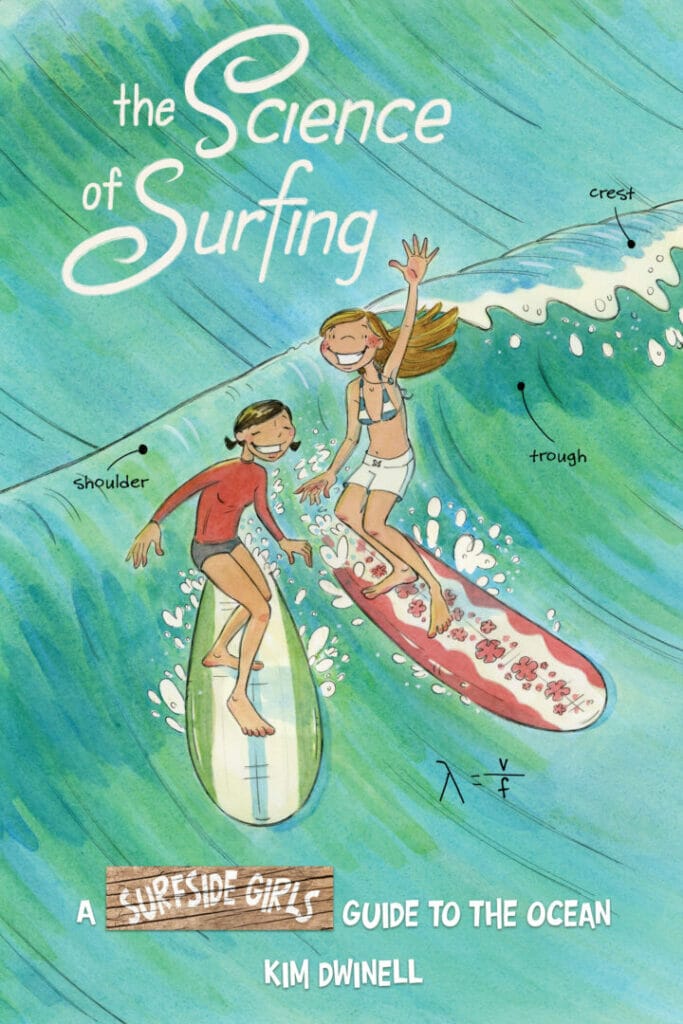
The Nerdy Basement: Tell us about the inspiration behind Surfside Girls and how that came about.
Kim Dwinell: The first two books are mysteries, you know, and I, as a kid, I grew up, you know, a beach-loving person to begin with. But I also loved Nancy Drew and Scooby-Doo and love me a good mystery. So I started writing these graphic novels about preteen friends, these two girls set in the sleepy beach town, right? Where this mystery would pop up. And they’d have to be out in awesome Southern California in order to solve these mysteries, right? So, so that’s one and two.
Okay, so let me back up a little bit. I used to work in animation a long, long time ago, I worked on Mulan, and I worked on Hercules I worked in hand-drawn animation with the pencil. And then, that kind of career ended I had that time off and I had a kid. And then I discovered graphic novels and I went back to grad school to learn to refresh my skills and do graphic novels. So at my grad shows these Surfside Girls, this first book was sort of, like hatched in grad school. And on the wall of my grad show, which is what you have to do to graduate you have to have your like thesis project up, I had one whole wall that was like “How To Surf?”
And I did it in comic [format] just to kind of like to go along with the 25 pages of the graphic novel I had, I thought this would be kind of fun interactive thing, you know, like, which foot do you put forward? Are you goofy or regular? And so I’m watching the gallery. And people are like shifting their foot back and forth. And I thought…I think people like this! I’m seeing a response to this. And so I kind of tucked that away in the back of my head and I had this spiral notebook, and on it, it says on the front of it, we said: “how to surf with Santa J?”.
So as I’m going into these mysteries, I think, you know, it’d be really cool to put in the book, like, you got to check your tide chart, right and see what your beach is doing. So maybe I’ll put some notes in the tide charts, and then like, where the tides come from? And it might be interesting, and I would put these little sticky notes in this binder, you know, this, this spiral notebook. And all of a sudden, I kind of had a book and I pitched it to Chris Furrows.
I said hey, you know, I’ve always wanted to do this how-to surf thing but this is becoming more of a companion, like a field guide to the ocean. You know, so I’ve got these main characters in this fictitious Southern California beach town. And I want to give you a guidebook to go with it. When you’re out in the ocean you’re gonna seek help.
What’s kelp about? You’re gonna see cute animals like what are the cute things you know? What are the birds you might see? And the physics of it all because, you know, I’ve surfed a good portion of my life. My best friend lives in Denver and she took me snowboarding, got me lessons and stuff a while back and I didn’t take to it and she goes, I don’t get it, you’ve surfed. I don’t get why you don’t get it.
And I said, there’s no energy like the mountain is not energy. A wave, you’re laying on the board and all of a sudden this thing is bringing your toes up above your head and you know, you got to pop up. Are you gonna endo? That energy? That physics. That swell. So I did a lot of research and, and I got to be honest, it was a godsend because I started this book, like in January 2020. And then COVID hit, you know, and I don’t know about you, but those that first month, at least the first couple months of COVID we weren’t so sure we were all gonna die, you know?
The Nerdy Basement: Oh, yeah. those first few months for me were just like, how do we transition? How do we live? How are things going forward? How do we stay safe? Everybody was panicking. There’s no toilet paper.
Kim Dwinell: It was really scary. Like, you know, so. So I knew I had this book to do and I thought, here’s what I’m going to do. I’m just gonna spend like my days, you know, wake up workout and then sit at my desk and I’m going to dig into this research. I’m going to throw myself into you know, watching the Monterey Bay aquariums live feed cams, and learning about kelp and watching you know, Blue Planet videos. and really getting into the stuff that I totally loved. Partially because I completely love this stuff. And partially because I just couldn’t look at the news.
The Nerdy Basement: I remember watching the news likes, oh, my God, just turn it off. Just turn off. This is getting deadlier every day.
Kim Dwinell: Yeah. And you think, Oh my gosh, how much of my family am I gonna lose to all this? All this stuff is going on in my head? And I thought no, I’m just gonna dive right into the “Science of Surfing” book and, and I wasn’t quite sure what to call it. And then it sort of just named itself. You know, and it’s sort of like a, you know, people like to go birding, right. They like to watch birds and they take a birding book.
And this is like an oceaning book, you know, so you want to go to the ocean, take your oceaning book and learn some stuff about the beach and about the tides and about the moons and the creatures that live there. And I tried to make it so that like, no matter where you live, you could say like, oh, tides happen everywhere. So what is my tide doing it my beach? You know, why is it different than Southern California? I tried to make it a bit more interactive.
The Nerdy Basement: So the thing that drew me to the book — see I’m, well I don’t go to the beach often, even though I live in Jersey, and there’s a couple of beaches here. You know, I’m more of a like a backyard pool kind of person, you know, I can control the waves, you know? I like to be in control a little bit. There’s no shark there, there’s no kelp tickling the bottom of my feet, you know? So, I stay back there, enjoy the sun, grab a bite to eat, sit down and jump back into the pool. But just like you at the beginning of COVID, I also dived into a lot of the nature shows, you know, with David Attenborough and stuff like that.
I watched “Life in Color” a lot. You know, this Blue Earth, Planet Earth, you know, he dives into the marine life and stuff like that. So you know, reading the premise of the book and going oh, wow, this is really interesting. And while I’ve never surfed in my life, you know, growing up as a kid, I was really into the X Games and watching Kelly Slater at the time because he was very popular. I used to play his video game on my Gameboy Advance, you know, we’ll play Kelly Slater. You know, his pro surfing game. You know, obviously, I used to play it on my Gameboy, I used to sit on my Gameboy for hours on end trying to master the wave, you know?
So I was like, Oh, this will be interesting to read and you know, kind of learn about you know, just surfing in general. But as I dived more into the book, I was like, Okay, so I’m reading about a whole bunch of animals that are on beaches I honestly didn’t even know of. So it’s very educational. What was specifically the reason I wanted to make it a middle-aged graphic novel series, as opposed to targeting some of the older generations that might be interested in either surfing or just learning more about the beach.
Kim Dwinell: My writing voice that comes out is kind of stuck in 12. I don’t know what happened to me at 12. But I like I don’t know junior high for me. I was a Marine brat. My dad was in the military. So we moved all the time. And Junior High was the only school in the history of schools for kindled O’Hare that I went to both years in the same school. It was sort of a miracle, you know, I made these really good girlfriends. And I don’t know if you remember back to junior high, but Junior High is like 100% awkward, because some of your friends are way more advanced than you and, and then you’re trying to keep up because like, I’m the oldest.
And I got to, you know, a younger brother younger sister. But some of my friends were the youngest. So they had the oldest brother who’s like in college, and they knew stuff I didn’t know, it was in junior high, is this big confusing mess of trying to sort through, you know, becoming, you know, getting into high school. I feel like those relationships were really loud and clear, in my mind. And for whatever reason, when my writing voice comes out, it always comes out as 12. So when I wrote these, these mysteries, you know, I kind of like I wrote the girls, they’re 12, you know, they’re in middle school. And then, so I figured my readership is like, a little younger than that to maybe, you know, maybe 12, or a little bit older than that.
And, when I did this field guide, I decided, you know, kids can smell education, right? Like, hey, Bobby, read this interesting book about science, you know, you certainly don’t want that. So I wanted it to be written in the style of my girls, chit-chatting, you know what I mean? Like, their banter. And then I tried to throw a little, you know, little brother Pete in there who’s the annoyance through all of the books.
The Nerdy Basement: You can feel that little brother being a little too nosey vibe all the time, which I thought was great. It played off very well with the girls and like, yeah, they’re trying to teach and they’re just trying to teach a whole bunch of friends or they’re young tutors and listen, let’s just go to the beach or they’re, they’re all chaperones on a field trip. This is that what the beach does, this is what a wave does. And here comes the annoying little brother. “Hey, I want to be cool too!”
Kim Dwinell: My favorite one is why don’t seagulls fly over the bay? Because then they’d be bagels.
The Nerdy Basement: Oh, yeah. I was like, oh my god. It’s so cheesy. But it’s so great. Subtle, yet effective!
Kim Dwinell: That’s the vibe I went for I spent a lot of time combing through like ocean jokes online, looking for ones that would make you groan, you know, and I thought was my favorite.
The Nerdy Basement: And in my mind, I’m reading it. I’m sitting in my living room. I’m reading I come across that line. I’m just like, I sit back in silence for a second and let it marinate. I was like, You know what? That was pretty good. That was pretty good. I’m not mad at it. That was pretty good. That was pretty good.
Kim Dwinell: You let it marinate, I love it!
The Nerdy Basement: I gotta let it marinate. Because sometimes, you know, it’s like you say it makes you want to groan. You’re like, she really said that. I’m just like, You know what? That’s a pretty good joke. I’m not gonna lie. That’s probably something I would say if I wanted to throw a couple of dad jokes myself, you know. So let’s talk a little about your time as a lifeguard, and what inspired you to become one?
Kim Dwinell: Well, let’s see. I spent you know, I guess we moved a lot. My dad, my dad grew up in Brooklyn, Brooklyn, and didn’t learn to swim until he joined the Marine Corps. And then he got put into that, like, you know, the stupid kid class for swimming in the Marine Corps, because he couldn’t swim and they had to teach him to swim. So that was one of those annoying things growing up, my dad made sure we were in swim lessons every summer all summer until I was like, 12.
You know, when when the kids are doing cool things. I’m still in swimming lessons. So as a result, like I’m a really good swimmer, I swam in high school, and then, and then I swim in, in community college, my little junior college, I was on the swim team there too. And I was surfing a lot I had, I picked up surfing. Like my, like, just before High School, there was a boy, of course, it’s always a boy, a boy named Joe.
The Nerdy Basement: One summer, one boy, and your life changes, you know? [laughs]
Kim Dwinell: Right? Once again, you know, I’m just on the cusp of adulthood here, you know, moving from junior high to high school. And I thought to myself, if I learned to surf, maybe Joe would like me. And so I learned to surf and then I just didn’t give a f*** about Joe anymore because I kind of fell in love with surfing. So when I end up surfing a lot later, and he was one of those, you know, womanizing type fools, but he was a good surfer.
So we did become friends. But anyway, that’s another story. So I did a lot of good sites with a lot of swimming. And I was dating a guy at the time. And he goes, you know, you should try out we’re going to beach lifeguard just looking for lifeguards, and you should try out. No, you got to understand them just a little bit under five feet. And I’m a woman, you know, and that automatically means I got something to prove, right?
The Nerdy Basement: Oh, yeah. Of course! Immediately, immediately.
Kim Dwinell: So I tried out and I made it and then did that week of training week in February. We’re swimming in the ocean and it’s like 50/51 degrees out and freezing. And yes, my lifeguard a couple of years down at Laguna Beach, which, if you ever get there to Southern California Laguna Beach is one of the prettiest places on earth, it’s got all these natural coves and rocks and reefs, and there’s wild, like sea life everywhere and kelp forests. It’s absolutely gorgeous. And those were some really important years to me because we work out every day we swim every day, swim, paddled around, in, you know, in the ocean, and there’s something about being in the ocean every day and be being that connected, you know, and then sometimes after work, we’d go surf, you know, when your days off you go surf.
I was living in the ocean. There’s a, you know, there’s, there’s a couple of things that stick in my mind, there was this one day, I was probably 19. And just as in shape as a person could get, you know, swimming with the guys, you know, in through the surf, and we’re coming around one of the points. And for whatever reason, the ocean was superduper, clear. And I could see all the way to the bottom, probably like 20 or 30 feet, and there’s kelp, and there are leopard sharks down there. And the Garibaldi and it was, it was like, the most magical moment ever.
And I thought like, wow, I’m so fortunate that I am a person who can do this. And I’ve got to remember how special this is, you know, you don’t think really big thoughts when you’re 19. But this was a big thought, you know, we’re like, I was just astonished at it all. And that, that feeling that I try to push that into my books.
The Nerdy Basement: Yeah, that’s great. I’ve been to California I’ve been to San Diego so you know because I went to San Diego Comic-Con one year, I got to see this. Oh, yeah, I got to hang around this the San Diego Marina and stuff like that, I got to see all that body of water, obviously, unfortunately, get to see live animals sea life. While I was out here, San Diego is incredibly incredible. I love the weather over there the water, right behind the convention center was just amazing. It was a great area to hang out. But um, but the best thing about is, like I said, trying to say, you know, being in the ocean, seeing all those animals, like I’m very when I watch, you know, documentaries about the ocean life and you know, I’m very attracted to like the core reason seeing the aquatic life and how crucial they are to the ocean and how the airline is also crucial to our lives.
The Nerdy Basement: So you know, as someone who spent, you know, you basically spend most of your life if not all your life by the ocean, how important it is to you, that we as humans preserve our oceans and the aquatic like aquatic life in it, in order to preserve our planet and our home?
Kim Dwinell: I don’t know how you got to do it in New Jersey but we banned plastic bags here. You know, those like one-time plastic bags from the market. So we banned them here in California. And it’s such a good thing because we probably banned the bags about four years ago, and I’m not kidding, I would go surf down at Seal Beach. And I would serve and then I would make sure I got out of the water half an hour early and I would spend all this time pull in plastic out of the surf plastic bag after plastic bag because you know, they blow you know the markets right up the street from the beach. And they blow and they end up in the ocean. And then they think of when they get standard of sticking out of the sand.
They’re damaging the wildlife. Just the banning of those bags has made a huge difference to my local beach. And I was doing a bit of biking. Long story, I hurt my knee I couldn’t run I was doing a bit of biking to rehab it and I was biking up our River Trail. And we stopped and I thought oh my gosh, I think I just saw a sea turtle so I called our local aquarium. I’m like am I crazy? Am I seeing sea turtles in our river? This river comes from inland and it’s not the cleanest river in the world right it goes through the LA metropolis. So the aquariums like for whatever reason we’ve got really in green turtles that are you know, they’re they live off Seal Beach Long Beach right here which is super strange because like I said this is not like pristine Maui by any stretch of the imagination.
And but I know that banning those plastic bags immediately has helped all of those turtles because they think they’re jellyfish they eat them up. So just this month I signed on to like you know, no plastic July challenge, am I going to tell you like I’m trying to be really really conscious about you know, I already have my own straws. I’ve got my own recycle bags, I got my, my you know my hydro flask it’s I got that far but you go to the market, you can’t get away from it. You know you get deli meat, it’s in plastic. I kind of get a little overwhelmed sometimes, but I feel like all we need to do is just the thing on this website. This plastic challenge was like just try to do a little bit better. Just a little bit. Everyone does a little bit better and it goes a long way.
The Nerdy Basement: I mean one step at a time. Baby steps. Small progress is still progress, you can’t do it all in one day but small steps lead to bigger steps.
Kim Dwinell: But you’re right it’s super crucial for our ocean’s health and you know they’ve already figured out that that you know, the ocean the kelp beds, they take in all this carbon You know, when they store it, there’s so much of the stuff that we don’t understand makes things work you know, effortlessly on our planet until it doesn’t you know, and we don’t even know the ways that we can be hurting it so you know, the living as gently as we can for sure. And I think I you know, I say surfing and of course, like you said, You’re on board with this too. You love the ocean, but I know there are just as many people who like to go hike or enjoy rivers or fly fishing in the middle of the country and no one wants to see trash in their wilderness no matter what that wilderness is.
The Nerdy Basement: Well, I enjoy nature just in general. My parents are from the Caribbean islands, you know, they’re Dominican and Puerto Rican. So you know, we have our islands are very, you know, they’re very beautiful. They’re in the Caribbean. So it’s all ocean life, you know, the, in the dead center of the ocean, you have the riverbeds you had that you have the beaches and all that you know, they like to maintain it keep it clean.
So my love of nature and the aquatic life whether it’s hiking, whether it’s on land, the woods, you know, the water, it just, it’s just in me so you know, I’m always on board with not wanting to dirty or dirty the beaches, I’m on board with wanting to clean the beaches, because I want to, I want the ocean to be clean. I want to see the animals whenever I go to the ocean, I want to see the animals whenever I am hiking, whenever I do decide to go hike, I don’t go hiking often. But whenever I do decide to go hiking, you know, I like to see the wildlife enjoying nature as you’re supposed to you know?
Kim Dwinell: You don’t want to get all messed up by Coke cans. I was hoping that with this book, it seems to me that when you can make a person love it, you can make a person want to protect it. That was sort of my goal is like, get people to fall in love with the outdoors with fall in love with the ocean. No one’s gonna go want to go like, Oh my gosh, can we go to the beach again, and let’s dump all our cash in it. No one’s gonna say that when they fall in love with it.
The Nerdy Basement: You’ve basically so my next question was, what do you think adults can pick up this book and learn a thing or two, about the importance of preserving our oceans and how crucial the oceans are to our livelihood and planet? But you pretty much answered with that one sentence I’ll take it!
Kim Dwinell: My editor Chris was like, Hey, you know, I sent him the first draft. He’s like, Oh, my gosh, I went down to the beach immediately and look for my high tide line. He’s like “I didn’t even know about this stuff”
The Nerdy Basement: See, as the tide chart. I wasn’t aware of tide charts. I just know that you know, the moon affects the waves. And I know they’re very, like the most minute of details when it came when it comes to the ocean and how the waves are how all of the ocean is affected by the moon, the sun, the water that ties the tide chart, what time of day affects the tide like there’s a lot of stuff, I guess I learned a lot by reading the book, stuff that I did not think I will be learning by reading the book, which is great, which is great. You’ve really done a good job of know teaching something while presenting, you know, a field guide to the ocean, essentially.
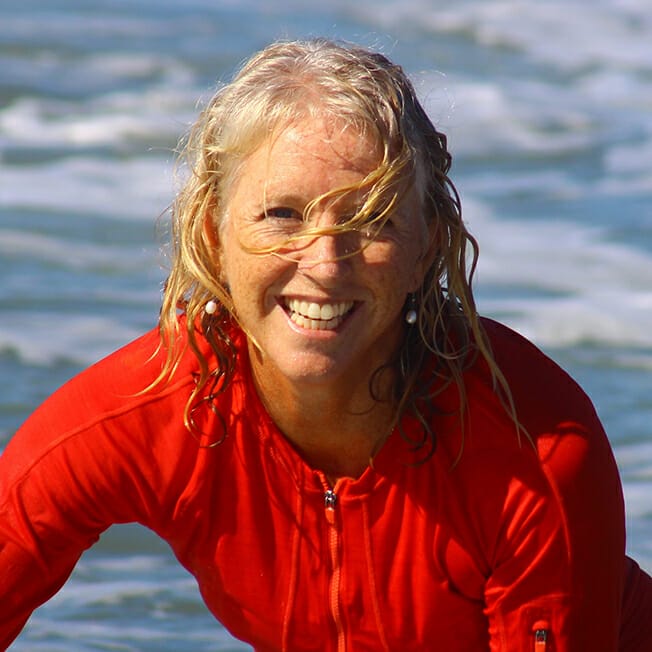
Kim Dwinell: Thank you. Yeah, I tried to do it in a way that could be easily understood by a child, as well as an adult, but I had to do it in a way that wouldn’t be boring to someone who’s 9 or 12.
The Nerdy Basement: So a couple of fun questions. We got a couple of questions left, we’re almost done. What is your best or worst experience as both a lifeguard and a surfer? I know there are some interesting stories from both aspects. So if you want to share a couple, feel free.
Kim Dwinell: So my worst experience as a lifeguard and a surfer, right? Well, a couple of them come to mind immediately. So those are probably the most important ones. I’ll start with being a lifeguard and down in Laguna Beach, we had a swell one day, it was a beautiful day on the beach. And there was a swell, that’s the worst kind of swell ever in the middle of the summer day. And that is where the ocean goes completely flat. And it stays completely flat until the next set comes through. So when the next set comes through the sets like 10 feet, and it pounds the beach and it shakes the beach, and like it’s like five or six waves like this, and then it goes flat again until the next set rolls through.
But in between those sets, people think it’s calm you were flying on a red flag from the towers. And in Laguna [Beach], we were required anytime we saw someone who looked like they might be a tourist or they didn’t really know what they were doing in the ocean. We had to go down with a sensor tube and say like, hey, just be advised that this is a really big That day like there are big strong waves that are coming through. The current is really strong today. And half the time if they’re if the wave isn’t breaking right then they look at you like, Are you crazy? You know, because right then there’s not a wave breaking. And at the time that I was lifeguarding, we still had El Toro and Tustin Marine base here by us and we would get a lot of young Marines who come in, you know, guys that had never seen the ocean.
Maybe they enlisted the Marine Corps from Kansas. They come out, they get trained, they go to El Toro or Tustin they come down to Laguna Beach. And they don’t know the first thing about the ocean, but they’re kind of manly guys, right? They’re like, boss. And so this was this one guy. He goes out to swim. And I had I told him, I said, you know, look, you know, we’re recommending that you go out with fins on only and if you don’t know what you’re doing, maybe once days like, I got this lifeguard, out, he goes, right. And then the set comes in this guy, this guy’s drowning, he’s getting pounded the sport, and he’s probably 19 or 20-year-old marine. And I’m like 19 or 20, myself, figured out through the surf but my fins on the after I wrap them in the tube, and he is crying. He is terrified.
And I have to push him because you got to push them to the bottom under the wave and then it slams you and then you pop up, you take a breath and I go, we got to do this like four more times. You just stay with me and we’re gonna go to the bottom and touch the sand. We’re gonna come back up and it’s gonna hurt, but it’s gonna be okay. So finally after the sets over, I pull him back on the beach, and he is bawling. And he grabbed me and like, it was embarrassing, and it was really hard to get him in. But it was one of those things where he was giving me a hard time on the way out.
And he was giving me a hard time on the way in. But he did sit down and cry. And he’s like, thank you. I would have died out there. I’m like, oh, man, we got to you know, but listen, lifeguards next time. That was a really hard one. Because it’s how you get out through 10-foot surf is not easy. It’s not easy. And then bringing a guy back through that surface is not easy either.
The Nerdy Basement: I got taken in by a wave at Seaside one time, and I was in there for I would say 30 seconds. And I was like, I can only imagine how hard it would be to be there for two minutes.
Kim Dwinell: I’ll take the ocean over a river any day, though. I’ll tell you that much. Because the ocean, I understand. The ocean pummels you and it pushes you to shore. A river can pummel you and you don’t necessarily get pushed ashore in a river. So that’s what I’m really scared of.
The Nerdy Basement: Unless you know waterfalls come in now, you know, it’s all a different story, right? You don’t know where it goes all the time.
Kim Dwinell: No, rivers are funky. Oceans are pretty straightforward, even though they can be really powerful. And I guess for my surfing story, there’s this place called Trestles, down south of San Clemente. I was down with my group of guys. And it was a beautiful day and the surf was perfect. And I’m surfing this wave, you know, taking a right and going right and this guy is way down the line. And he’s going left. And I see him coming at me. And I think, okay, I better kick out, you know, go back over the back of this wave. So I turn to kick out and he just falls he falls off his board and we’re riding shortboards at the time.
And that board comes and the nose of that board hits me in the head, right in the ear, and knocks me out. Which is terrifying. So luckily, I’m surfing with my guys because I surf alone a lot. And one of them saw me, put me on the board, and paddled me in. I couldn’t talk. So they had brought a moped down the path and they tied me to the back of the moped. The guy driving brought me up and brought me to the Rip Curl surf shop where they put me in a car and they took me to San Clemente hospital. My dad had to come up from Pendleton because I was only 17. And I still couldn’t talk and my ear was hanging off.
So the plastic surgeon put my ear back on and it took about three hours before I could talk again. So here I am in the ER, in the emergency room with my guy friends, and we’re all soaking wet, and I’m in a bathing suit like bleeding like mad and can’t talk and they’re like we can’t do anything until our dad gets here because you know, we need some identification. We need to know who she is. So yeah, that was probably my scariest time as a surfer and I’ll tell you what if that happened to me now I probably wouldn’t go back. but you know when you’re 17 you’re not all that smart [laughs]
The Nerdy Basement: Of course, I mean, live and learn; get a couple of bruises along the way.
Kim Dwinell: At 17 You never think you’re gonna die?
The Nerdy Basement: No, of course, you never that’s the last thing you worry about at 17.
Kim Dwinell: Right.
The Nerdy Basement: At least you’re good now. At least you’re good. Now you’ve recovered, which is the best thing I mean, the best result out of any experience like that. But as far as my final question, are there any plans to animate this series as you know, you have a history in animation with any plans to do something type of like web series or pitch a TV network or get like a little show going for educational purposes?
Kim Dwinell: I’ll never say never. I’ll say that I would love to spend some time doing that. I got it. I promised I would get this third mystery out, so as soon as the Steel Guy comes out I’m going to head down on that third mystery, but afterward, absolutely. It’s something I would love to do. That’s the big dream. So we’re gonna keep our fingers crossed.
The Nerdy Basement: Fingers crossed because I think the characters that you created are likable enough to entertain a young audience you know, junior high school, right in the age group you’re targeting the nine to 12-year-olds; I think away entertain them enough. Kim, it was a great conversation I enjoyed the book we hope to get more eyes on it so people can learn more about surfing, learn more about the ocean and learn how important the ocean is to our daily lives even though we’re not by the ocean every day.
Kim Dwinell: I really appreciate you talking to me. Send me links to the stuff and I’ll push that on my social media too when that’s up.
The Nerdy Basement: Yeah, I’ll send it to Laura and I’ll send it to you as well.
Kim Dwinell: I really appreciate it.
The Nerdy Basement: I appreciate you for taking the time out. I appreciate the rescheduling as well I know everyone’s busy. I appreciate it all, appreciate the time, it was a great conversation. Good luck with the rest of your stories and more success to you. Thank you so much.
Kim Dwinell: You too. Thank you.
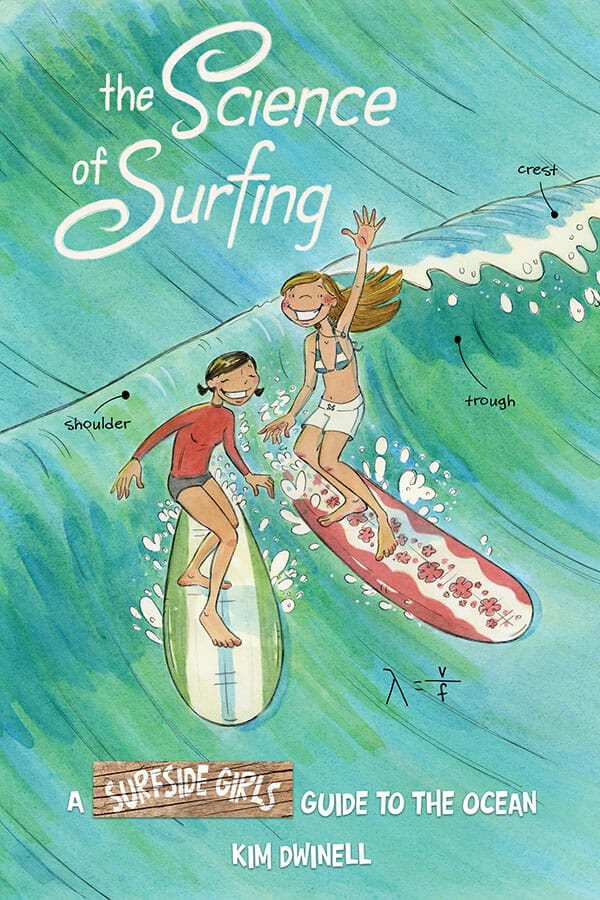
Kim Dwinell’s “The Science of Surfing: A Surfside Girls Guide to the Ocean” releases September 28th through Top Shelf Productions an imprint of IDW Publishing.
Want to discuss things further? Hit us up on Twitter, Facebook, or Instagram. And for more film, gaming, anime, and TV news, trailers, and updates make sure to keep it locked right here at The Nerdy Basement. While you’re here, please consider supporting us on Patreon! It’s an easy way of supporting us so we can keep providing you with your Nerdy News!
Images approved by IDW Publishing, Kim Dwinell, and Top Shelf Productions.

